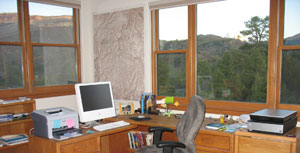 |
I'd say half of my ideas come from personal experiences, and the other half come from reading (research). But that's such a vague answer. I can give you a lot more specifics when you click on Will's Books, then again on the individual title you're wondering about. I'll tell you where the ideas, and often the characters, came from for that particular book, plus you'll see pictures from the stories. How long does it take you to write a book? It usually takes a year, but within that year there's actually about six months' worth of work. I leave time for travel, for speaking to conferences of teachers and librarians, for family occasions, and for wilderness adventures. Do you have to revise a lot? I'm never satisfied with the first draft. I keep working on it to make it better. Usually my editor in New York helps me by telling me which parts of the story are working well and which parts I should go back and work on some more. Most of the time I'll have three drafts before I'm finished. Reaching the goal is so satisfying — having the book come out and having readers. When you're writing, how much do you work each day? Usually from nine to five, with breaks for checking the refrigerator, making my afternoon latte, getting the mail, stuff like that. I can build up more intensity if I work all day long. If the story is really cooking, I'll go back to my study in the evenings.
It's the greatest. Out my windows I see cliffs where falcons nest, and high mountain peaks that are white with snow about seven months out of the year. You can see my views in the photo on this page.
Did you do that comic strip, Calvin and Hobbes? Kids are always asking me that. I wish! Once I got a letter from a reader who said he loved my books, but told me to keep doing that comic strip too! Which of your books is your favorite? It's always my most recent one, because I'm still living it in my head. The characters are very real to me, and I'm still with them. Is there a theme that runs through your books? A teacher once told me that there is. When I asked her what it was, she said it's in the words of one of my characters. I was intrigued. She explained that it can be found at the end of Johnny Raven's letter in Far North: “Take care of the land, take care of yourself, take care of each other.” I like the idea that this theme runs through all of my stories. I can't always find all your books at the bookstore. What's the deal? Sometimes it's an Easter egg hunt, but here are a few pointers. Some of them will be in what's called the “Young Reader” or “Middle Grades” section, and others will be in the “Young Adult” or “Teenage” section. If your local bookstore doesn't have the one you're looking for, you can always have them order it for you. You can also order all of my books online, with one of the online book stores like Barnes & Noble. By the way, all of my books are also available as audio books. How old were you when you first started writing? In school I wrote reports and essays, that kind of thing, but I didn't actually start writing stories and poetry until I was in college. Back when I was a kid, we weren't being encouraged in school to try writing our own stories like kids are today. I think it's terrific how many kids are seeing themselves as writers, and are creating their own stories and poems. Do you believe that writers are “made, not born”? I really do. You learn by doing it, just like you'd learn to play a musical instrument or learn to play basketball. You can do it! Writing begins with reading. I think of reading as the rain and snow that filters into the underground water table of your imagination. Writing is like sinking a well. If you're a reader you'll have a reservoir of good ideas and a feel for language that will prove invaluable as you start to write. Have any writing tips? Write! You get better by doing it. Get a rough draft written that you can work with, and revise it later. Find a partner who also likes to write and read each other's stuff, provide encouragement, make suggestions. Remember that both readers and writers are imagining what it's like to be someone else, so write with the five senses. Let your readers hear, see, smell, touch, and taste what your characters are experiencing. |
|



